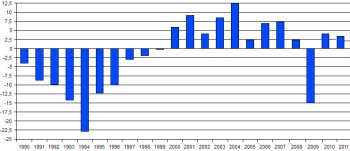Navigate the Stormy Seas of Options Trading by Learning from Others’ Mistakes
 If you follow the career of master investor Warren Buffett at all then you know the man has an uncanny sense of how to make money. But are you aware that Warren Buffett once lost $534 million on options trading? Just goes to show that even the best among us can make mistakes. However, you can’t afford to make a staggering mistake like that.
If you follow the career of master investor Warren Buffett at all then you know the man has an uncanny sense of how to make money. But are you aware that Warren Buffett once lost $534 million on options trading? Just goes to show that even the best among us can make mistakes. However, you can’t afford to make a staggering mistake like that.
When you have mastered the basics of options trading you’ll feel empowered to start making money by placing your own PUT and CALL contracts out there on the market, but watch out. There are plenty of mistakes to avoid. Here is a quick rundown of some of the most popular ones.
Out of the Money According to Marketwatch blogger Darren Fischer asks you to step back and look at the percentage move you’ll have to see in a stock’s value before it will hit an attractive price target for you. The higher the percentage and the shorter the time frame, given nothing spectacular happening for that company, the less likely that a stock will move the way you want it to.
It’s About Probabilities According to Jason Ayres, writing on Learn to Trade Global: “Know the stock you are trading options on, determine your outlook, select the appropriate time frame and manage the position accordingly. And when in doubt GIVE YOURSELF A LITTLE MORE TIME!”
Copycat This Price Charts Top Ten article says the number 1 mistake that people make is “following the crowd”. They say “the biggest profits are made by catching moves before the crowd has a chance to react.”
Lack of Discipline Leading the list of mistakes in this Corr Sight article on mistakes is the lack of money management. “Professional traders recommend risking a set percentage of capital and never altering that percentage,” they point out.
Timing In this interview with Wayne Gorman the expert trader said that a common mistakes is buying “options with too little time left to expiration”. You don’t want to be too close to the call.
Options are Not Stocks You are trading options on stock sales, not actual stocks themselves. The contract you buy or sell obligates the seller to make shares of stock available at a set price (with possible protections against severe changes in value). According to this article on NASDAQ’s Website some options traders confuse their options contracts for shares of stock. They are not the same thing.
The trading landscape is filled with temptations and hidden traps. It is vital that you do perform due diligence because you are risking your own money. Numerous research tools and services are available and the variety of selection may seem overwhelming, but make a few choices and test their usefulness.
Where you end up in the trading markets is largely up to you. You’ll have to make your own luck by seizing good opportunities at the right time. Knowing to avoid the above mistakes and others will help you achieve that.



